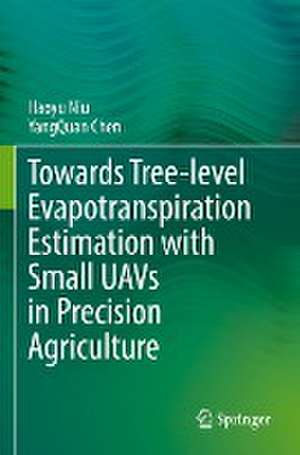Towards Tree-level Evapotranspiration Estimation with Small UAVs in Precision Agriculture
Autor Haoyu Niu, YangQuan Chenen Limba Engleză Paperback – 29 oct 2023
This book examines the different UAV-based approaches of ET estimation. Models and algorithms, such as mapping evapotranspiration at high resolution with internalized calibration (METRIC), the two-source energy balance (TSEB) model, and machine learning (ML) are discussed. It also covers the challenges and opportunities for UAVs in ET estimation, with the final chapters devoted to new ET estimation methods and their potential applications for future research.
| Toate formatele și edițiile | Preț | Express |
|---|---|---|
| Paperback (1) | 776.51 lei 43-57 zile | |
| Springer International Publishing – 29 oct 2023 | 776.51 lei 43-57 zile | |
| Hardback (1) | 782.01 lei 43-57 zile | |
| Springer International Publishing – 28 oct 2022 | 782.01 lei 43-57 zile |
Preț: 776.51 lei
Preț vechi: 946.96 lei
-18% Nou
Puncte Express: 1165
Preț estimativ în valută:
148.59€ • 155.53$ • 123.67£
148.59€ • 155.53$ • 123.67£
Carte tipărită la comandă
Livrare economică 31 martie-14 aprilie
Preluare comenzi: 021 569.72.76
Specificații
ISBN-13: 9783031149399
ISBN-10: 3031149394
Ilustrații: XXIV, 156 p. 60 illus., 56 illus. in color.
Dimensiuni: 155 x 235 mm
Greutate: 0.28 kg
Ediția:1st ed. 2022
Editura: Springer International Publishing
Colecția Springer
Locul publicării:Cham, Switzerland
ISBN-10: 3031149394
Ilustrații: XXIV, 156 p. 60 illus., 56 illus. in color.
Dimensiuni: 155 x 235 mm
Greutate: 0.28 kg
Ediția:1st ed. 2022
Editura: Springer International Publishing
Colecția Springer
Locul publicării:Cham, Switzerland
Cuprins
Chapter 1: Introduction.- Chapter 2: ET Estimation Methods with UAVs: A Comprehensive Review.- Chapter 3: Existing ET Estimation Methods with UAVs: Results and Discussions.- Chapter 4: Estimating Actual Crop Evapotranspiration Using Deep Stochastic Configuration Networks Model and UAV-based Crop Coefficients in A Pomegranate Orchard.- Chapter 5: Reliable Tree-level Evapotranspiration Estimation of Pomegranate Trees Using Lysimeter and UAV Multispectral Imagery.- Chapter 6: Tree-level Water Status Inference Using UAV Thermal Imagery and Machine Learning.- Chapter 7: Conclusion and Future Research.
Notă biografică
YangQuan Chen received his PhD degree in advanced control and instrumentation from the Nanyang Technological University in Singapore. Currently, he is a full professor at the University of California Merced. His Mechatronics, Embedded Systems and Automation (MESA) Lab at UC Merced is emerging as a widely known “drone lab” with the vision to build an “agriculture drone valley” in California’s Central Valley. The lab’s work on low-cost, reliably airworthy, multispectral UAV-based remote sensing systems helps create a new type of information services valuable not only for farming and growing, but also for environmental monitoring and assessment. Prof Chen has published over 300 peer-reviewed paper and more than 20 books/book chapters.
Textul de pe ultima copertă
Estimating evapotranspiration (ET) has been one of the most critical research areas in agriculture because of water scarcity, the growing population, and climate change. The accurate estimation and mapping of ET are necessary for crop water management. Traditionally, researchers use water balance, soil moisture, weighing lysimeters, or an energy balance approach, such as Bowen ratio or eddy covariance towers to estimate ET. However, these ET methods are point-specific or area-weighted measurements and cannot be extended to a large scale. On the other hand, while remote sensing is able to provide spatially distributed measurements, the spatial resolution of multispectral satellite images is often not enough for crops with clumped canopy structures, such as trees and vines. Unmanned aerial vehicles (UAVs) can mitigate these spatial and temporal limitations. Lightweight cameras and sensors can be mounted on the UAVs and take high-resolution images. Unlike satellite imagery, the spatial resolution of the UAV images can be at the centimeter-level. UAVs can also fly on-demand, which provides high temporal imagery.
This book examines the different UAV-based approaches of ET estimation. Models and algorithms, such as mapping evapotranspiration at high resolution with internalized calibration (METRIC), the two-source energy balance (TSEB) model, and machine learning (ML) are discussed. It also covers the challenges and opportunities for UAVs in ET estimation, with the final chapters devoted to new ET estimation methods and their potential applications for future research.
Caracteristici
A review of the ET estimation with small UAV New field methods for ET estimation Application of uncooled thermal camera
